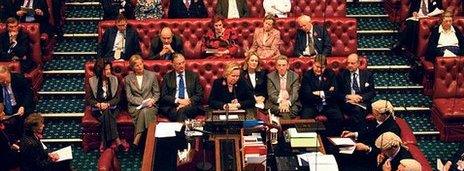What now for House of Lords reform?
- Published

The coalition government's attempt to reform the House of Lords has failed - so is that the end of the story.... or could there still be changes to Parliament's second chamber?
Never mind Nick Clegg. Forget about the coalition. The decision to abandon plans to reform the House of Lords is bad news for rabbits.
Conservative MPs have scuppered the idea of elections to the second chamber. So for the time being, at least, life in the Lords will carry on as normal with the political parties appointing new life peers.
The new members will need ceremonial robes for big occasions like the State Opening of Parliament. The robes might be called ermine (stoat) but in fact it's rabbit fur. The black spots are painted on.
But the rabbits aren't the only ones with a problem.
Lord Steel wants to make it easier for peers to retire or to be expelled
Back in July when MPs held their first debate and vote on the government's House of Lords Bill, the Leader of the Commons, Sir George Young, announced that ministers had decided to shelve a programme motion - which would have allowed the proposals to speed through the Commons - rather than face certain defeat at the hands of Conservative rebels and Labour.
MPs will return to Westminster at the start of September when Sir George was expected to announce that the government had set aside several weeks of parliamentary time so that the Commons could debate the details in the Bill.
Now, ministers will have to find something to plug the gap in the legislative timetable.
It may sound perverse but they could decide to use the time to consider proposals to, ahem, reform the House of Lords.
Just before peers began their summer break they gave their final approval to plans put forward by the former Liberal leader, David - now Lord - Steel, to allow members of the House of Lords to retire.
Peers would also face expulsion if they failed to attend at all during a session of Parliament or were jailed for more than a year for a criminal offence.
MPs are due to debate the plans as a Private Member's Bill. Ministers could improve the Bill's chances of becoming law by giving it time and government support.
Lord Steel has been trying for years to change the House of Lords. In order to get his Bill through the Upper House, he had to ditch plans to remove the remaining hereditary peers and to set up a commission to appoint independent or crossbench peers.
If the government decided to adopt the plans, some of those more radical changes could be re-introduced.
- Published6 August 2012
- Published6 August 2012
- Published7 August 2012
- Published6 August 2012